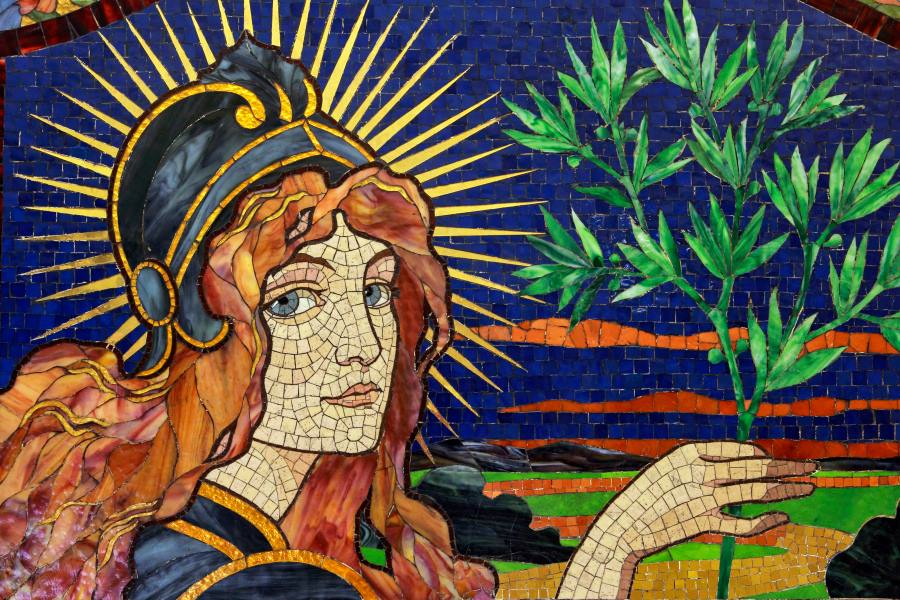1/8
Endre Ady Memorial Museum
By passionately expressing deeply personal emotions through revolutionary poetry of love and loneliness, while fearlessly attacking the dishonorable status quo of belle-époque Hungarian society with his journalism, Magyar writer Endre Ady (1877-1919) earned an eternal place of pride in Hungary’s rich literary history. Nowadays anybody can visit the downtown-Pest apartment where Ady spent the final years of his life and wrote his last volume of poetry, shared with his beloved wife Csinszka; here visitors can admire Ady’s handwritten correspondence, personal photographs, and his humble home office.
Where: Budapest 1053, Veres Pálné u. 4-6
More details
2/8
Gizi Bajor Actors’ Museum
Tucked amid the leafy Buda Hills, the palatial walled villa of cherished Magyar actress Gizi Bajor (1893-1951) now welcomes visitors to learn about her impressive work in the spotlight, along with the careers of three other prominent leading ladies of Hungary’s National Theater – Mari Jászai, Emília Márkus, and Hilda Gobbi – dating back over 140 years. While Bajor’s home museum is not preserved to appear similarly to when the actress resided here, the beauty of this neo-Baroque mansion and its surrounding garden create a genuinely dramatic setting for appreciating Hungary’s theatrical history.
Where: Budapest 1124, Stromfeld Aurél út 16
More details
3/8
Béla Bartók Memorial House
Far from the city’s noisy bustle, Béla Bartók (1881-1945) rented a charming three-story Buda home in 1932, and here Hungary’s leading 20th-century composer and pioneering ethnomusicologist lived and worked in peace – until he temporarily left for the United States in 1940, and tragically could never return to his native country because of World War II’s onset. Bartók left behind many of his most prized possessions here, and so today this memorial museum is regarded as the world’s most complete monument to his life – relics on view include his folk instruments, eyeglasses, watches, waistcoats, and even a cigarette butt.
Where: Budapest 1025, Csalán út 29
More details
4/8
Zoltán Kodály Memorial Museum
For over four decades, globally influential composer Zoltán Kodály (1882-1967) lived in downtown Pest at the grand traffic circle that bears his name, and the four-room apartment where he and his family resided is now a fascinating public display that is largely unchanged from when the maestro filled these chambers with his genre-blending melodies. Here we can visit Kodály’s colorfully furnished dining room, piano parlor, and library filled with books on music history, ethnography, and Hungarian literary masterpieces, along with several folk instruments and early-20th-century recording devices.
Where: Budapest 1062, Andrássy út 87-89
More details
5/8
Hungarian Museum of Trade and Tourism
Graceful Magyar writer Gyula Krúdy (1878-1933) penned eloquently transcendent vignettes of bourgeois life in Budapest, evocatively describing dining and drinking experiences at many fine restaurants across the city, so it’s appropriate that Hungary’s primary institution dedicated to the country’s hospitality industry now encompasses Krúdy’s former home in Óbuda. The chambers where he spent his final years are now decorated with placards presenting the hotels and rented rooms occupied by this oft-destitute wordsmith until settling down here, along with a recreated eatery based on Krúdy’s prose.
Address: 1036 Budapest, Korona tér 1.
More details
6/8
Ferenc Liszt Memorial Museum
Towards the end of his extremely successful career as a musical virtuoso, Franz Liszt (1811-1886) founded his namesake Academy of Music and personally taught many of the 19th century’s premier Magyar talents. While he did not accept any payment for this work, he was provided with an apartment in the school’s original location on Andrássy Avenue, and to this day his chambers are preserved as a memorial to this supremely talented composer and pianist, furnished with many authentic accoutrements from Liszt’s life – from a silver music stand to a walnut writing desk with a built-in miniature piano.
Where: Budapest 1064, Vörösmarty u. 35
More details
7/8
Miksa Róth Memorial House
During the booming construction of Art Nouveau buildings amid Budapest’s fin-de-siècle era, brilliant Hungarian applied artist Miksa Róth (1865-1944) crafted a multitude of the city’s most enchanting mosaics and stained-glass windows – including many still shining in the Parliament House. Róth’s own home in urban Pest is now adorned with vivid displays of his most renowned works, along with a recreation of his family’s private rooms with century-old furnishings. Now open again following comprehensive renovations, guests will be dazzled when walking through this luminous locale.
Where: Budapest 1078, Nefelejcs u. 26
More details











